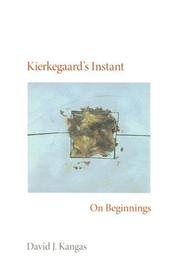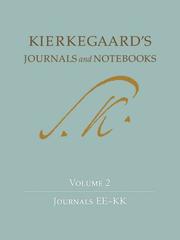| Listing 1 - 10 of 12 | << page >> |
Sort by
|

ISBN: 1282078429 9786612078422 025311697X 9780253116970 9780253348593 0253348595 9781282078420 6612078421 Year: 2007 Publisher: Bloomington : Indiana University Press,
Abstract | Keywords | Export | Availability | Bookmark
 Loading...
Loading...Choose an application
- Reference Manager
- EndNote
- RefWorks (Direct export to RefWorks)
In Kierkegaard's Instant, David J. Kangas reads Kierkegaard to reveal his radical thinking about temporality. For Kierkegaard, the instant of becoming, in which everything changes in the blink of an eye, eludes recollection and anticipation. It constitutes a beginning always already at work. As Kangas shows, Kierkegaard's retrieval of the sudden quality of temporality allows him to stage a deep critique of the idealist projects of Fichte, Schelling, and Hegel. By linking Kierkegaard's thought to the tr
Kierkegaard, Soren, --- Kierkegaard, Søren --- Anti-climacus --- H. H. --- Kierkegaard, Søren. --- Kierkegaard, Søren, --- Anti-Climacus, --- Bogbinder, Hilarius, --- Chʻi-kʻo-kuo, --- Climacus, Johannes, --- Constantius, Constantin, --- Eremita, Victor, --- Haufniensis, Vigilius, --- Johannes, Climacus, --- Johannes de Silentio, --- Kʹerkegor, Seren, --- Kierkegaard, S. --- Kierkegaard, Severino, --- Kierkegaard, Søren Aabye, --- K'i︠e︡rkegor, Sʹoren, --- Kīrkajūrd, Sūrīn, --- Kirkegaard, Soeren, --- Kirkegor, Seren, --- Ḳirḳegor, Sern, --- Kirkegors, Sērens, --- Kirukegōru, Søren, --- Kjerkegor, Seren, --- Kʻo-erh-kʻai-ko-erh, --- Notabene, Nicolaus, --- Silentio, Johannes de, --- Sūrīn Kīrkajūrd, --- Victor, Eremita, --- Vigilius, Haufniensis, --- קירקגור, סרן --- קירקגור, סורן --- קירקגור, סירן --- קירקגור, סירן, --- קירקגורד, סרן, --- 克尓凯郭尓, --- Kierkegaard, Sren,
Book
ISBN: 1350020052 9781350020054 Year: 2018 Publisher: London: Bloomsbury Academic, an imprint of Bloomsbury Publishing Plc,
Abstract | Keywords | Export | Availability | Bookmark
 Loading...
Loading...Choose an application
- Reference Manager
- EndNote
- RefWorks (Direct export to RefWorks)
Kierkegaard's religious discourses - his writings which have explicitly dealt with religion - have historically been given scant attention by philosophers. They have generally been considered to be of less philosophical interest than his 'proper' philosophy. Errant Affirmations radically questions this claim and considers Kierkegaard's religious writings as absolutely central to his philosophical vision. Through close and clear readings of Kierkegaard's work, David Kangas argues that contemporary philosophical themes - gift, temporality, language, death, nothingness, economy and selfhood- are not only evident in the 'religious' works but explored with real depth and fascination. Above all, the book argues that Kierkegaard's positive account of the human condition, his "ontology," fully emerges only in these discourses. It shows how these discourses are organized around an "errant" kind of affirmation-namely, an affirmation of existence that is without conditions. Such affirmation involves the intensification of life around "today" and coincides with a joy that has no particular cause. It is an affirmation capable of affirming life even amidst its finitude and suffering. Errant Affirmations is a fresh interpretation of Kierkegaard's understudied works that not only opens up a new reading of Kierkegaard but elucidates his 'religious' texts and places them organically within his philosophy as a whole
Religion --- Philosophers --- Kierkegaard, Søren, - 1813-1855
Book
ISBN: 1350020079 1350020044 9781350020047 9781350020078 9781350020061 1350020060 1350020052 9781350020054 Year: 2018 Publisher: London : Bloomsbury Academic,
Abstract | Keywords | Export | Availability | Bookmark
 Loading...
Loading...Choose an application
- Reference Manager
- EndNote
- RefWorks (Direct export to RefWorks)
"Kierkegaard's religious discourses--his writings which have explicitly dealt with religion--have historically been given scant attention by philosophers. They have generally been considered to be of less philosophical interest than his 'proper' philosophy. Errant Affirmations radically questions this claim and considers Kierkegaard's religious writings as absolutely central to his philosophical vision. Through close and clear readings of Kierkegaard's work, David Kangas argues that contemporary philosophical themes--gift, temporality, language, death, nothingness, economy and selfhood--are not only evident in the 'religious' works but explored with real depth and fascination. Above all, the book argues that Kierkegaard's positive account of the human condition, his "ontology," fully emerges only in these discourses. It shows how these discourses are organized around an "errant" kind of affirmation--namely, an affirmation of existence that is without conditions. Such affirmation involves the intensification of life around "today" and coincides with a joy that has no particular cause. It is an affirmation capable of affirming life even amidst its finitude and suffering. Errant Affirmations is a fresh interpretation of Kierkegaard's understudied works that not only opens up a new reading of Kierkegaard but elucidates his 'religious' texts and places them organically within his philosophy as a whole."--Bloomsbury Publishing.
Religion --- Philosophers --- Philosophy. --- Kierkegaard, Søren, --- Criticism and interpretation.
Book

ISBN: 9781400833962 1400833965 Year: 2010 Publisher: Princeton, NJ : Princeton University Press,
Abstract | Keywords | Export | Availability | Bookmark
 Loading...
Loading...Choose an application
- Reference Manager
- EndNote
- RefWorks (Direct export to RefWorks)
Søren Kierkegaard (1813-55) published an extraordinary number of works during his lifetime, but he left behind nearly as much unpublished writing, most of which consists of what are called his "journals and notebooks." Volume 3 of this 11-volume edition of Kierkegaard's Journals and Notebooks includes Kierkegaard's extensive notes on lectures by the Danish theologian H. N. Clausen and by the German philosopher Schelling, as well as a great many other entries on philosophical, theological, and literary topics. In addition, the volume includes many personal reflections by Kierkegaard, notably those in which he provides an account of his love affair with Regine Olsen, his onetime fiancée.
Book

Year: 2015 Publisher: Princeton, NJ : Princeton University Press,
Abstract | Keywords | Export | Availability | Bookmark
 Loading...
Loading...Choose an application
- Reference Manager
- EndNote
- RefWorks (Direct export to RefWorks)
Søren Kierkegaard (1813-55) published an extraordinary number of works during his lifetime, but he left behind nearly as much unpublished writing, most of which consists of what are called his "journals and notebooks." Volume 2 of this 11-volume edition of Kierkegaard's Journals and Notebooks includes materials from 1836 to 1846, a period that takes Kierkegaard from his student days to the peak of his activity as an author. In addition to containing hundreds of Kierkegaard's reflections on philosophy, theology, literature, and his own personal life, these journals are the seedbed of many ideas and passages that later surfaced in Either/Or, Repetition, Fear and Trembling, Philosophical Fragments, The Concept of Anxiety, Stages on Life's Way, Concluding Unscientific Postscript, and a number of Edifying Discourses.
Book

Year: 2010 Publisher: Princeton, NJ : Princeton University Press,
Abstract | Keywords | Export | Availability | Bookmark
 Loading...
Loading...Choose an application
- Reference Manager
- EndNote
- RefWorks (Direct export to RefWorks)
Søren Kierkegaard (1813-55) published an extraordinary number of works during his lifetime, but he left behind nearly as much unpublished writing, most of which consists of what are called his "journals and notebooks." Volume 3 of this 11-volume edition of Kierkegaard's Journals and Notebooks includes Kierkegaard's extensive notes on lectures by the Danish theologian H. N. Clausen and by the German philosopher Schelling, as well as a great many other entries on philosophical, theological, and literary topics. In addition, the volume includes many personal reflections by Kierkegaard, notably those in which he provides an account of his love affair with Regine Olsen, his onetime fiancée.
Digital

ISBN: 9781400833962 9780691138930 Year: 2010 Publisher: Princeton, N.J. Princeton University Press
Abstract | Keywords | Export | Availability | Bookmark
 Loading...
Loading...Choose an application
- Reference Manager
- EndNote
- RefWorks (Direct export to RefWorks)


ISBN: 9781400874330 9780691133447 Year: 2015 Publisher: Princeton, N.J. Princeton University Press
Abstract | Keywords | Export | Availability | Bookmark
 Loading...
Loading...Choose an application
- Reference Manager
- EndNote
- RefWorks (Direct export to RefWorks)
Book

ISBN: 9781400845330 Year: 2013 Publisher: Princeton, NJ
Abstract | Keywords | Export | Availability | Bookmark
 Loading...
Loading...Choose an application
- Reference Manager
- EndNote
- RefWorks (Direct export to RefWorks)
Digital

ISBN: 9781400840236 9780691149035 Year: 2011 Publisher: Princeton, N.J. Princeton University Press
Abstract | Keywords | Export | Availability | Bookmark
 Loading...
Loading...Choose an application
- Reference Manager
- EndNote
- RefWorks (Direct export to RefWorks)
| Listing 1 - 10 of 12 | << page >> |
Sort by
|

 Search
Search Feedback
Feedback About UniCat
About UniCat  Help
Help News
News